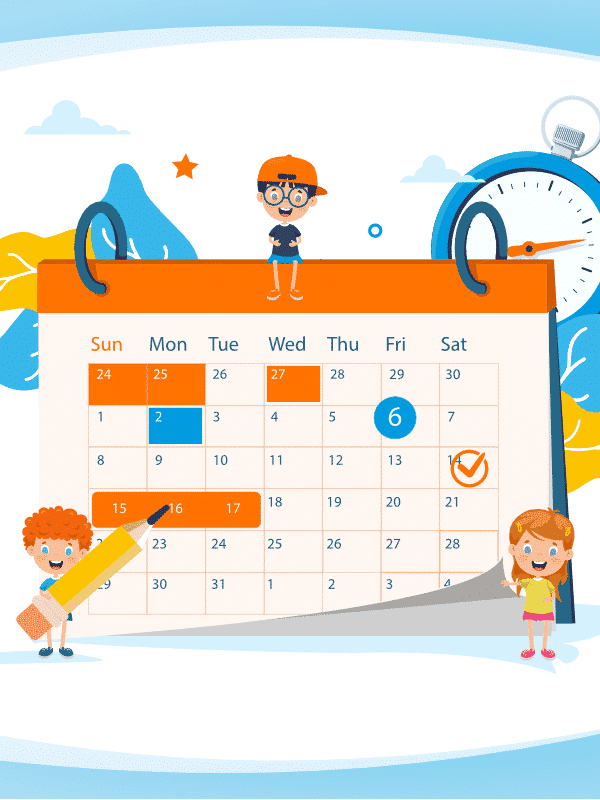You won’t let us lie: Holidays and celebrations are some of the coolest and most interesting days for everyone! If workplaces and schools won’t give us the day to relax, they will at least prepare something cool to commemorate or celebrate. That already makes it super fun.
But it becomes even better when we know what the day is about, because we learn about history, different cultures, traditions and so on. Therefore, the holidays become interesting too. This is why it’s so important we teach our children about different national and festive days.
But wait! It all can get even better! While celebrating holidays and learning about them, kids can also improve their Spanish skills! The first step to do that is by learning the names in Spanish of different holidays and celebrations. Today, we’ll guide your kids through that. Come on!
Benefits for Kids that Celebrate Holidays in Spanish
- Enhancing all their language skills
This one might sound obvious, but celebrating holidays, from their own countries or from other countries, will make kids improve all their language skills. Because they’ll be immersed in a Spanish environment.
If everybody at the celebration speaks in Spanish, even if it’s not their mother tongue, children will learn from them. They’ll train their ears, they’ll read whatever posters there are in Spanish, and will be forced to talk in Spanish. Therefore, all their skills will improve more than you can imagine. It’s the perfect practice of a real Spanish scenario.
- It’s fun time, not study time
Kids learn very well through fun activities. So, if they celebrate the holidays they already know in Spanish, they’ll be learning while having a good time. This means they’ll acquire the language in a casual and relaxing way. Because it’ll be in an environment that they already know they love, like a festivity.
Even if it’s a Hispanic festivity they don’t know much about, they’ll still improve their Spanish in a super fun way. Maybe even more if they celebrate it in the country the holiday is originally from. They might even make Hispanic friends!
Basically, kids won’t feel like they’re studying Spanish. They’ll just be having a cool time celebrating and will casually acquire and practice their Spanish while doing that.
- They’ll learn more than Spanish
Sure, kids will learn Spanish and will improve the language skills they already have. But they’ll also learn about traditions, history, culture, and maybe even geography of their own and other countries.
This is a huge advantage for other school subjects, like History. They’ll be very smart in terms of culture. But it’s also great for when they travel abroad or socialize with foreign people.
It will make them more culturally aware, more empathetic and more respectful. Their perspective of the world will grow as they discover more about their own country and especially more about other countries.
Spanish Names of Holidays
Not all holidays or special days are made to party, some are more serious than others. Some are just made to commemorate and pay tribute. Just like not every one of these holidays is celebrated worldwide.
Some countries do share the same holidays, but there are also other holidays that are just celebrated in a few or one country. Whatever the case, it’s important kids (and adults) know the Spanish names for those important days.
- Christmas’ Eve – Nochebuena
- Christmas – Navidad
- New Year’s Eve – Noche vieja
- New Year’s Day – Año Nuevo
- Martin Luther King Jr. Day – Día de Martin Luther King Jr.
- Valentine’s Day – Día de San Valentín / Día de los Enamorados / Día del Amor y la Amistad
- Cinco de Mayo – Cinco de Mayo
- International Women’s Day – Día Internacional de la Mujer
- International Men’s Day – Día Internacional del Hombre
- Children’s Day – Día del niño
- President’s Day / Washinton’s Birthday – Día de los Presidentes
- April Fools’ Day – Día de los Inocentes
- Easter – Pascua
- Cinco de Mayo – Cinco de Mayo
- Mother’s Day – Día de las Madres
- Father’s Day – Día de los Padres
- Earth Day – Día de la Tierra
- Teacher’s Day – Día del maestro
- Independence Day – Día de la Independencia
- Fourth of July – Cuatro de Julio
- Labor Day – Día del trabajo
- Grandparents Day – Día de los abuelos / Día del abuelo
- Columbus Day – Día de la Raza
- Veterans Day – Día de los Veteranos
- Memorial Day – Día de los Caídos / Día de la Conmemoración de los caídos
- Thanksgiving Day – Día de Acción de Gracias
- Halloween – Halloween / Día de Brujas / Noche de Brujas
- Hanukkah – Janucá / Jánuca
- Flag Day – Día de la Bandera
- National Hispanic Heritage Month – Mes Nacional de la Herencia Hispana
Hispanic Holidays’ Names in Spanish
Many Spanish speaking countries celebrate many of the holidays above, like Christmas, Valentine’s Day and Halloween. But they don’t celebrate all of them, like Fourth of July; though they do know they exist.
There are also some holidays that are specifically for Hispanic countries. Some of these are more festive than others. Some require parades and huge celebrations. Others are just to honor and pay tribute to historical figures or events of certain countries.
Here are the names of some of those celebrations; we also add where each day is celebrated:
- Three Kings Day – Día de Reyes (Hispanic countries and even some European ones)
- Day of the Death – Día de los Muertos (Mexico)
- Inti Raymi (Inti festival) / Sun Festival – Inti Raymi / Fiesta del Sol (Peru)
- Flowers Festival – Feria de las Flores (Colombia)
- Harvest Festival – Fiesta de la Vendimia / Fiesta Nacional de la Vendimia (Argentina)
- Saint George’s Day – La fiesta de Sant Jordi (Spain)
- Baron Bliss Day – Día del Barón Bliss (Belize)
- Feast of the Virgen de Urkupiña – Fiesta de la Virgen de Urkupiña (Bolivia)
- Little Candles Day – Día de las Velitas / Noche de Velitas (Colombia)
- Emancipation Day – Día de la Emancipación (Puerto Rico)
- Day of Remembrance for Truth and Justice /Día Nacional de la Memoria por la Verdad y la Justicia (Argentina)
- Candlemas – Día de La Candelaria / Fiesta de la Virgen de La Candelaria (Many different Hispanic countries, like Spain, Bolivia, Peru, Mexico, Chile, and others)
- Founding of Asunción – Día de la Fundación de Asunción (Paraguay)
- Cochabamba Day – Día de Cochabamba (Bolivia)
- The Tomatina – La Tomatina (Spain)
- Chaco Armistice Day – Dia de la Paz del Chaco (Paraguay)
- Day of the Battle of Boyacá – Día de la Batalla de Boyacá (Colombia)
- Juan Pablo Duarte Day – Natalicio de Juan Pablo Duarte (Dominican Republic)
- Pan American Day / America’s day – Día Panamericano / Día de las Américas (Different countries across the American continent)
- Guelaguetza Festival – Fiesta de la Guelaguetza (Mexico)
- Birthday of Eugenio María de Hostos – Natalicio Eugenio María de Hostos (Puerto Rico)
- Landing of the 33 Patriots Day – Aniversario del Desembarco de los Treinta y Tres Orientales (Uruguay)
- Valencia Fallas Festivity – Fallas de Valencia (Spain)
- Fiesta Patronales Holiday – Fiestas Patronales de San Salvador (El Salvador)
- San Miguel Carnival – Carnaval de San Miguel (El Salvador)
- Revolution Day – Día de la Revolución (Different Hispanic countries celebrate their national revolutions in different days)
- Constitution Day – Día de la Constitución (Different Hispanic countries celebrate it in different dates)
- Posadas – Posadas (Different Latin American countries, like Mexico, Guatemala, Honduras, Panama, and more.)
It’s worth noting another huge festivity in many Hispanic countries: The carnivals, which in Spanish are called “carnavales”. We mentioned the Carnaval de San Miguel in El Salvador, but that’s not the only one. Carnivals are celebrated across different Spanish speaking countries.
And sometimes there are many carnivals throughout the year in just one country. That’s why there’s not one specific date for these celebrations.
There it is! These are just a few of the national holidays and festive days celebrated in some Hispanic countries. They all represent different cultures. What other Hispanic holiday or festivity do you know?
Celebrate Spanish Cultures and Language with TruFluency Kids!
Ready to keep celebrating the Spanish speaking world? Great, so do we! TruFluency Kids keeps the party going with our Spanish classes with native teachers who know language and culture go hand in hand.
Our teachers will make sure kids acquire useful knowledge for a real situation through our immersion classes. This means we mainly teach in a Spanish environment; we barely speak English. And we encourage kids to also speak in Spanish, so they achieve language fluency. On top of that, we educate through fun activities, like singing, dancing, cooking and doing crafts.
Because we know you have a tight agenda, our classes are completely online and we have flexible schedules. Our classes go from 9 am to 9 pm (CST) the seven days of the week. So no driving for hours in the traffic to get to our school. Study with us from anywhere in the world at any time.
Take a 30-minute trial class now with a live, native teacher! After it, you’ll have the opportunity to take a parent Q & A to answer all your questions. Then, sign up for our next four-week session and let’s start celebrating and honoring Hispanic cultures.


